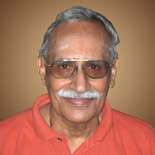|
Go to Part 23 II - The three states of experience Our experience as the jéva with these three bodies is in the three states of waking, dreaming and deep sleep [169]. In the waking state, we function through the physical body, the sense organs and the antaù-karaëa making use of our gross, subtle and causal bodies. In this state, we remain connected with the world by knowing it through our sense organs and interacting with it through our organs of action. We function as the knower (jïätä), the doer (kartä) and the experiencer (bhoktä). Our experience is stored in the memory and contributes to the formation of latent tendencies in the mind called väsanäs. Our physical, oral and mental actions done by exercising our free-will earn us the fruits of action (karma-phala), which consists of puëya (merit) and päpa(demerit).
In the dream state, our identification with the gross body ceases. We do not know that we have a physical body and that there is a physical world. Our connection and transaction with the waking world ceases. Now we are interacting in the dream world with a dream body with dream sense organs. All these are subtle and are created by our mind with the impressions stored in it. These impressions could also be of our previous lives [170]. During the dream, our dream body and sense organs and the dream world seem no different from the physical body, sense organs and the waking world. Our dream world appears as external to us just like the physical world in our waking state. We depend on the dream world the same way as we depend on the waking world in the waking state. The dream world is as real to us during the dream as the outside world is to us in waking state. It is only on waking up that we call our experience as a dream that had occurred within us. Only then, we realize that the dream world was not supporting us but that we had created the dream world and its transactions.
The distinction between the dream and waking states is very elusive. During the dream, everything is as real as the waking state. The dream tiger is as real as the tiger in the waking state and the dream fear of the dream tiger is equally real. If we say that dream objects are unreal and that the dream water will not quench the thirst in the waking state, it is equally true that the water jug placed near the bed will not quench the dreamer’s thirst. Just as what is affirmed by the dream experience is denied by the waking experience, what is experienced in the waking state is denied by the dream experience. We experience nothing in the dream that would suggest that the experience that we are having is different from that of the waking world. Thinkers of all traditions have always been baffled as to whether there is any real difference between them. King Janaka once underwent the experience of being a beggar in one of his dreams. On waking up, he experienced himself as a king. He wondered as to which one of them is to be taken as true. So, he asked his guru: Am I a king dreaming of being a beggar or a beggar dreaming of being a king? The question arises out of mixing up of two different states. The waking state is, however, generally considered as real and the dream state as unsubstantial. This is because others can also perceive what we perceive in the waking state. Moreover, the dream lasts a few minutes whereas the waking state extends for hours. There is also the continuity of the waking world despite the interruption caused by the dream or the sleep. Only with the attainment of self-knowledge, we would come to know that the waking world also lacks essential substantiality like the dream.
In the deep sleep state, we function only in our causal body. Our antaù-karaëa is dormant. We do not experience our physical body, the physical world and our mind. We do not have any I-sense or our memory. There is neither the internal perception of the antaù-karaëa nor the external perception of the jagat. We do not know that we are asleep. Only the involuntary activities are functional. Since the mind is withdrawn, we remain free from all effort. We do not know anything during the sleep and we enjoy our sleep. On waking up, we identify ourselves with the very person who went to sleep with the same mind, memory and I-sense. We also know that we slept happily without knowing anything. Thus, it is not a state of blankness but of awareness of the state of enjoyment as well as of not knowing anything. This state of consciousness is described as, “though seeing then, it does not see”. [171].
During deep sleep, since the I-sense identified with the mind, the sense organs and the physical body is not functional, our existence is without the nature of the individual. There is the absence of the subject-object duality. In that sense, we have intimations of our true self during deep sleep. But we continue to be ignorant of our true self since the causal body is the very basis of our ignorance of our true nature. It is a state not of knowledge but of ignorance. Even though we experience happiness during sleep, we do not know that it is derived from our intrinsic nature.
169. The waking, dream and deep sleep states are called respectively, jägrat-avasthä, svapna-avasthä and suñupti-avasthä. Go to Part 25
|
|||
|
|||


www.advaita.org.uk
Advaita for the 21st Century



Vedanta - Part 24
VEDĀNTA the solution to our fundamental problem
D. Venugopal

D. Venugopal is a student of Swami Paramarthananda and a direct disciple of Pujya Swami Dayananda. He has successfully completed the long-term residential course in Vedanta and Sanskrit conducted from May 2002 to July 2005 at the Arsha Vidya Gurukulam, Anaikatti.
Go to CONTENTS
Biography
Buy from Amazon UK
. Available from Bharatiya Vidya Bhavan centers at London, New York and Sydney.
. Also through the IBH Books & Magazines Distributors Pvt. Ltd. - contact contact@ibhworld.com. In case of difficulty,pvsankarankutty@bhavan.info can be contacted.
BOOK DETAILS
Publisher: Bharatiya Vidya Bhavan
ISBN: 978-81-7276-457-9
Format : Paperback
Pages: 324
List Price: US$7.00
Where to Buy
AUTHOR DETAILS

